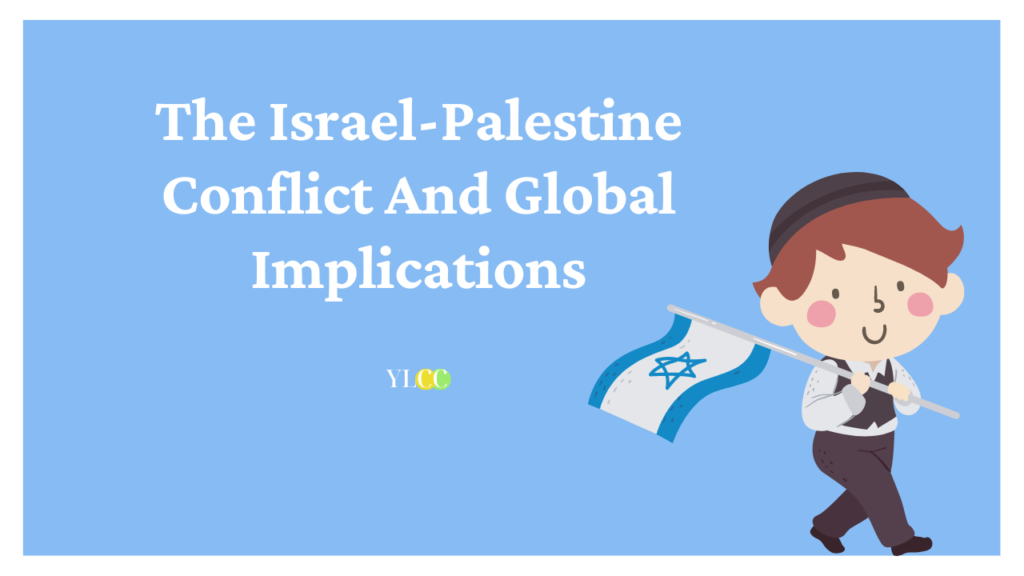
INTRODUCTION
At the global level, nowadays, the system of balance of powers seems to have become obsolete as true realities of a different world are clearly visible. But a similar procedure is as yet utilitarian when Israel and Palestine are concerned; that military preparedness, threats, alliances, need for mediation and suspicions. The Israeli-Palestinian conflict is complicated. It is based on national, political, territorial, cultural, and religious factors. Both Israelis and Palestinians want the same thing: land. One party has a state, while the other does not. However, it is not just about land; it is also about the right to self-determination. This is not a discord between Jews and Muslims, or Jews and Arabs. It has nothing to do with the Bible or the Old Testament.
This is a relatively modern conflict. In this article, Team YLCC aims to give a comprehensive overview on this age-old international conflict. Read on!
WHAT IS THE ISRAEL – PALESTINE CONFLICT ABOUT?
The Israeli-Palestinian clash is one of the world’s longest-running and most disputable clashes. At its heart, it is a contention between two self-assurance developments — the Jewish Zionist and the Palestinian nationalist project — that makes a case for the same land. The dispute arose was caused by religious affiliations. The political conflict began in the early 20th century where both Jews and Arab Muslims date their claims to the land back a couple of thousand years. At the point when the British order finished in 1947, the United Nations (UN) proposed an Arab-Jewish segment of Palestine — among Palestine and the new province of Israel. This parcel plan commanded 53 percent of the land to the Jewish-lion’s share state (Israel) and 47 percent to the Palestinian-greater part state (Palestine). Be that as it may, making another Jewish dominant part state didn’t look good for the Arab nations in the Middle East. The Arabs resisted, seeing the land as rightfully theirs. An early United Nation’s plan to give each group, a part of the land, failed, and Israel and the surrounding Arab nations fought several wars over the territory. The 1967 war is significant for the present clash, as it left Israel in charge of the West Bank and Gaza Strip, two regions home to huge Palestinian populaces.
Today, the West Bank is nominally controlled by the Palestinian Authority and is under Israeli occupation. This comes as Israeli soldiers, who uphold Israeli security limitations on Palestinian development and exercises, and Israeli pilgrims, Jews who construct ever-extending networks in the West Bank that viably deny the land to Palestinians[1].
PRESENT SITUATION
An Israeli court ordered the eviction of many Palestinian families from Sheikh Jarrah, an area of East Jerusalem, by May 2021 and the transfer of their land to Jewish people in October 2020. A number of Palestinian families from Sheikh Jarrah appealed the court’s decision in February 2021, which led to demonstrations calling for a halt to the violent eviction of Palestinians from their homes in Jerusalem as well as the hearings on the appeal[2].
Late in April 2021, Palestinians started protesting the impending evictions in the streets of Jerusalem, and Sheikh Jarrah’s residents and other activists started holding nightly sit-ins. After a judge decided in favour of the evictions in early May, the protests grew and Israeli police used force against the protesters. At the al-Aqsa Mosque compound in Jerusalem, violence broke out on May 7 after weeks of daily protests and rising tensions between protesters, Israeli settlers, and police during the month of Ramadan. Israeli police used stun grenades, rubber bullets, and water cannons in their altercation with protestors, leaving hundreds of Palestinians hurt. As a result of the fighting in Jerusalem’s Old City, tensions in East Jerusalem rose, which was exacerbated by Jerusalem Day celebrations. The militant organisation that controls Gaza, Hamas, and other Palestinian militant groups fired hundreds of rockets into Israeli territory on May 10, following several days of unrest in Jerusalem and the deployment of deadly and nonlethal force by Israeli police. In response, Israel launched multiple airstrikes that resulted in the deaths of around twenty Palestinians, followed by artillery bombardments on sites in Gaza[3].
Egypt mediated a cease-fire between Israel and Hamas on May 21. Both sides declared success, and there have been no reports of violations. Over the course of the eleven days of combat, more than 250 Palestinians died, approximately 2000 were injured, and at least 13 Israelis perished. The United Nations estimates that more than 72,000 Palestinians were displaced by the fighting, while authorities in Gaza estimate that tens of millions of dollars worth of damage was done.
GLOBAL IMPLICATION OF CONFLICT
Iran, a sworn enemy of Israel that supports Hamas, could be drawn into the conflict by seizing this opportunity to retaliate for recent Israeli attacks on its ships carrying oil and weapons. Iran has also accused Israel of carrying out cyberattacks on its nuclear facilities. Similarly, Israel has accused Iran of launching missiles at its ships in the Gulf of Oman. According to Israeli media, rockets were also fired into Israel from Syria and Lebanon. These could have come from Iranian proxies. If these attacks continue, Israel will undoubtedly retaliate, broadening the scope of the conflict and bringing countries and terrorist organisations supported by Iran into the fray.
The Abraham Accord, which involves US, UAE, and Israel, leading to UAE forming diplomatic relations with Israel is likely to face hurdles. The Accord had two major principles which Israel violated. First, developing colonies in East Jerusalem by evicting Arabs and access to Al-Aqsa complex. Other Muslim countries are also attempting to profit from this conflict. Fuat Oktay, Turkey’s Vice President, stated, “Everyone who does not take a clear stance against this is a party to this torment.” Unfortunately, when we look at Muslim countries that do not demonstrate this unity and togetherness, we see that everyone who does not take a clear stance is a party to this. Turkey seeks to divide the Muslim world, challenge Saudi power in the OIC, and expand its control over Hamas, which it backs. Since the conflict began, Turkey tried to convince leaders of other countries like Malaysia, Qatar, and Jordan to come to its fold. Pakistan also Supported Turkey for its stand to call an OIC (Organisation for Islamic Corporation) meeting. To counter the Turkish effort, Saudi Arabia called for a virtual OIC foreign ministers conference to condemn “Israeli acts of brutality against Palestinians and the use of force by Israeli police against protesters at the al-Aqsa mosque in Jerusalem.” Moreover UNSC has urged Israel to immediate cease its hostilities and urged Hamas to immediately stop the rocket attacks into Israel[4].
The United Nations is also trying to infuse some fresh recruits into the peace process among Israel and Palestine. It is exploring ways to engage India’s participation in the peace talks and already asked India to mediate between the two. Various statesmanship and leaders from the different parts of the world have been calling India and intending to engage it in resolving the protracted conflict between the two countries i.e. Israel and Palestine in the Mediterranean region. Modi took a de-hyphenated approach in maintaining a good relationship with the two. Other than being unapologetic in regards to connecting with Israel, he is set up to manage both the parties independently and bilaterally. India has been balancing the ties with Israel and Palestine since the establishment of diplomatic relations with Israel in 1992. Israel has risen as a significant Indian trading partner in the Middle East. However, India also continued to support the pursuit of Palestinian political rights. India’s staunch support was shown when it sponsored the UNGA resolution granting non-member observer state status to the Palestinians. In November 1988 India was also among the first countries to recognize the state of Palestine[5].
CONCLUSION
Many individuals have died and been injured as a result of the ongoing conflict between Israelis and Palestinians. The humanistic principles at the core of both Judaism and Islam have suffered even more severe harm as a result. The golden rule has mostly been forgotten among Jews and Muslims in Israel and Palestine. Both faiths had embraced the tenet that one should not treat others as one would not wish to be treated. There are ethical voices on both sides, but they are getting harder to hear. The podium is occupied by immoral and dishonest extremists. Rarely is their right to speak in front of their religious group disputed. The American determination to shield Israel from the political and legal repercussions of any and all of its actions has also taken its toll. The United Nations Security Council was intended to be the last arbiter and enforcer of a global order where the rule of law could shield the weak and defenceless from the abuses of the powerful.
The United States regularly uses its veto to block the application of well-established rules of international law to Israel. The world has periodically allowed its compassion for Palestinians, as underdogs, to outweigh its legal judgement. The Security Council has changed from being a supporter of the rule of law as the norm for global government to an opponent of it. The United Nations and other international fora have become powerless to address fundamental issues of justice and human dignity as a result of repeated American vetoes on behalf of Israel. These institutions no longer inspire much confidence. As a result, the Israel-Palestine conflict has created a world where the rule of law and the methods by which it might be achieved have been purposefully diminished.
YLCC would like to thank Dipti Tharwani for her valuable contributions in this article.
[1] Bar-Tal, D. (1990). Israeli-palestinian conflict: A cognitive analysis. International Journal of Intercultural Relations, 14(1), 7–29. https://doi.org/10.1016/0147-1767(90)90045-x
[2] Haushofer, J., Biletzki, A., & Kanwisher, N. (2010). Both sides retaliate in the Israeli-Palestinian conflict. Proceedings of the National Academy of Sciences, 107(42), 17927–17932. https://doi.org/10.1073/pnas.1012115107
[3] Chambial, Shiven. (2021). The Sheikh Jarrah Dispute: Through an Israeli Perspective. SSRN Electronic Journal. http://dx.doi.org/10.2139/ssrn.3898712
[4] Kakar, H. (2021). Global Impact of Israel-Palestine Clashes. Centre for Land Warfare Studies.
[5] Szydzisz, M. (2016). Israeli-Palestinian conflict – a catalog of problems to solve. Review of Nationalities, 6. https://doi.org/10.1515/pn-2016-0009






